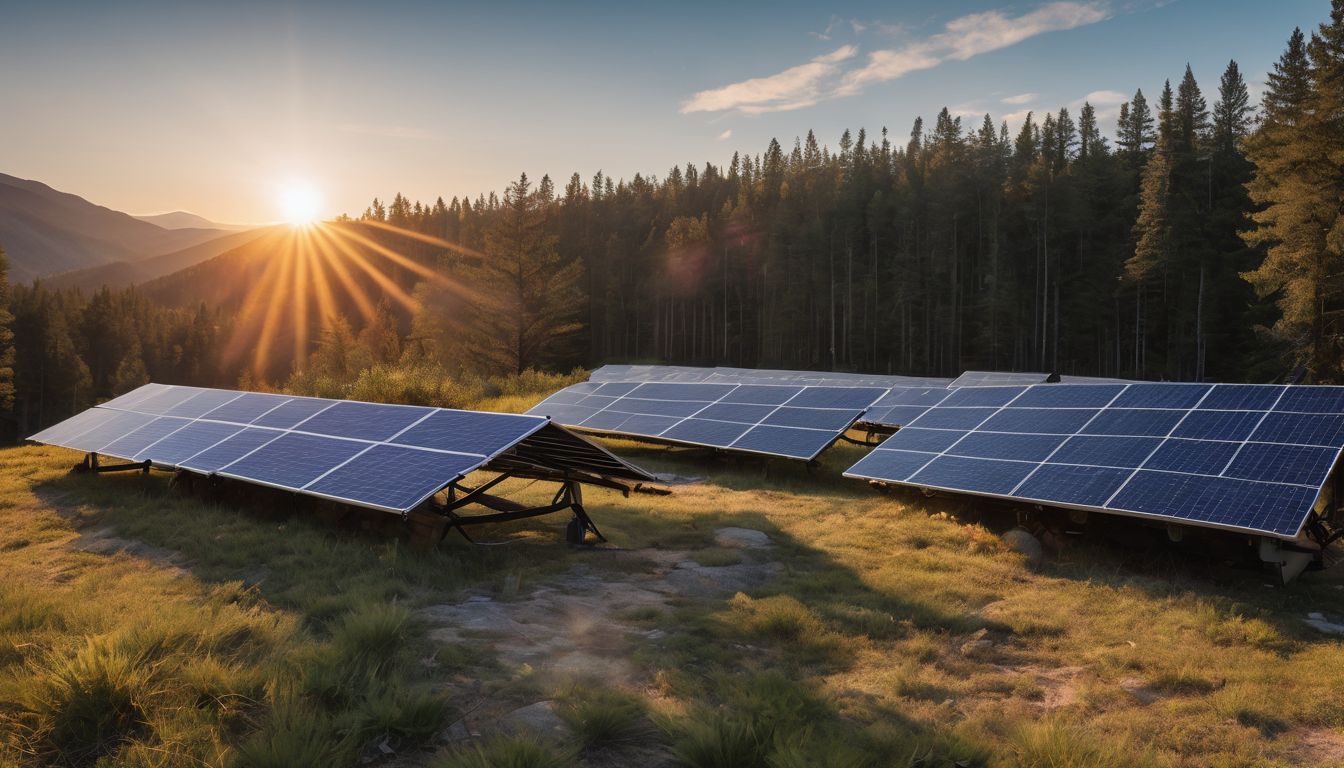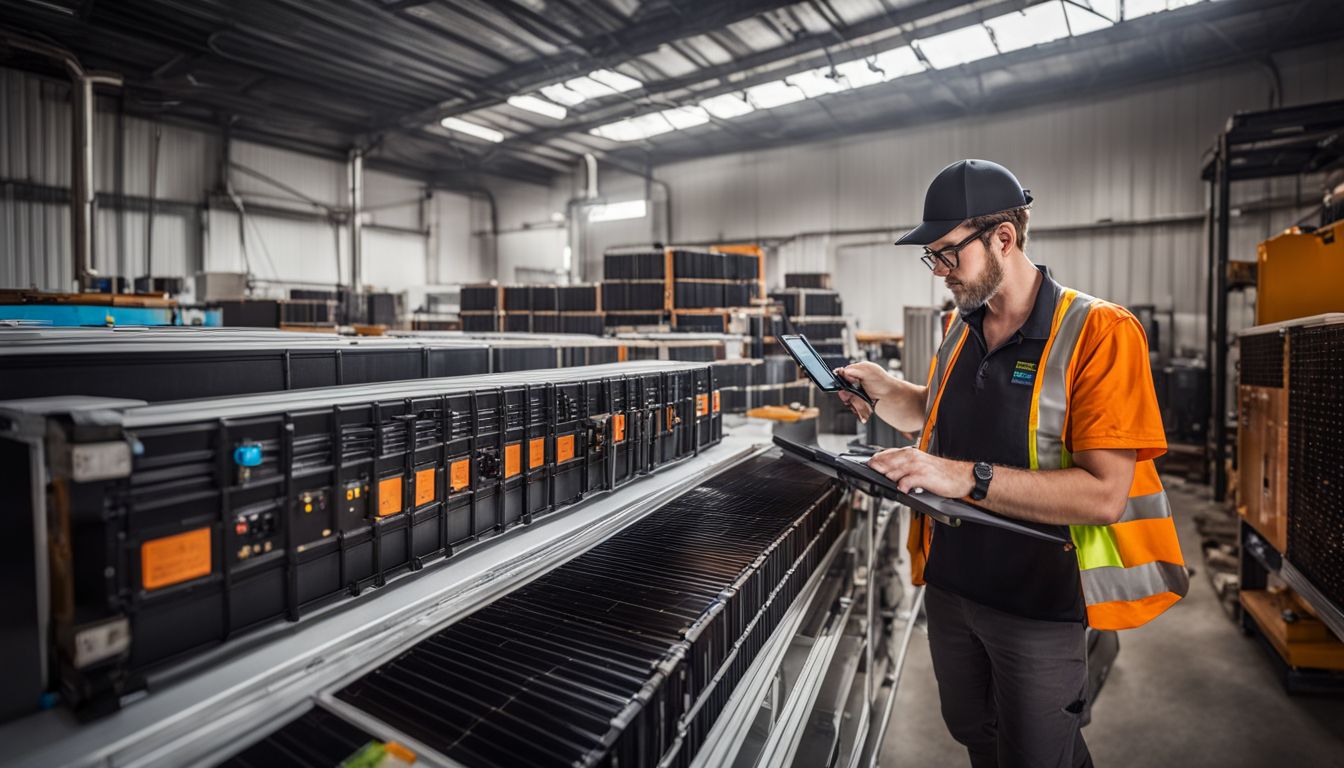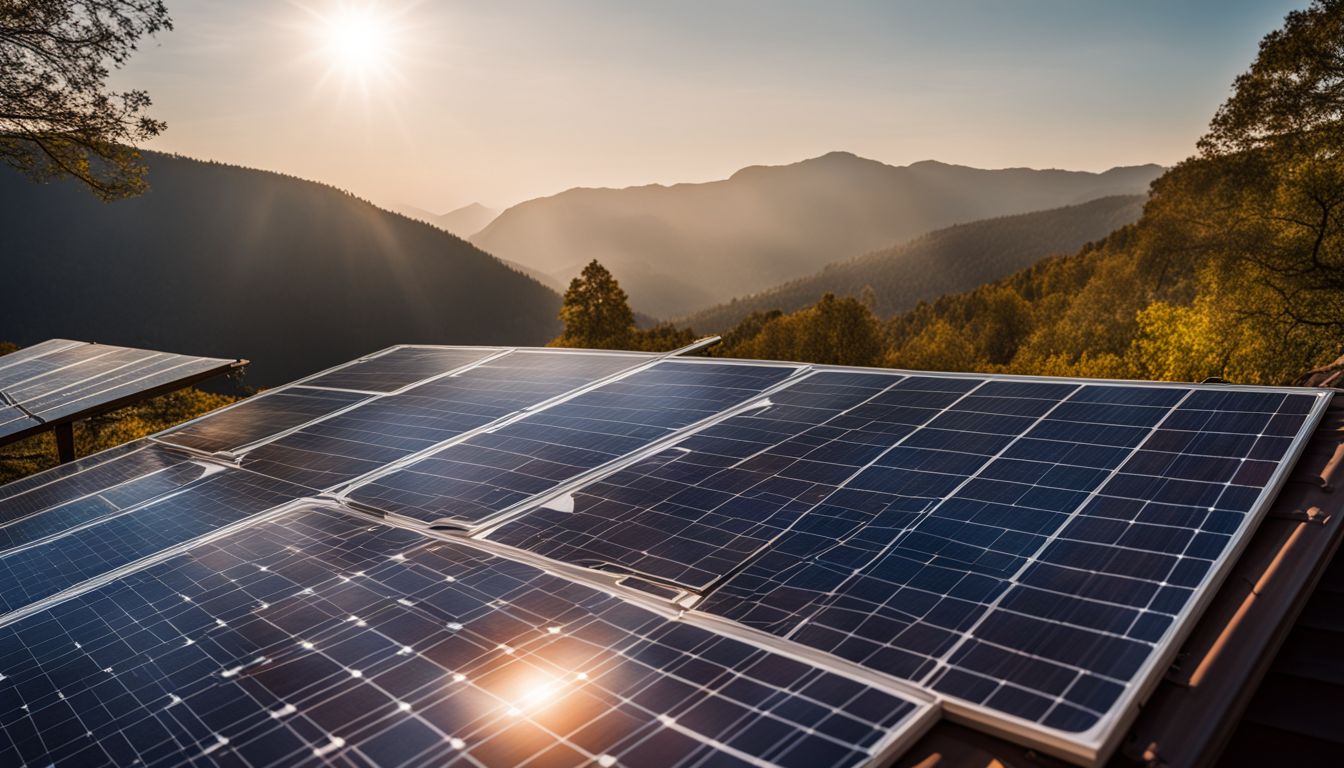How many batteries are needed per solar panel?

Deciding how many batteries to pair with your solar panel can be puzzling. Each solar setup is like a unique puzzle, needing different numbers of pieces—or batteries—to work best.
This article will illuminate the path to finding just the right number of batteries for your solar panels, ensuring you're never left in the dark. Keep reading; it's simpler than you think!
Key Takeaways
- Solar batteries store extra energy from panels for when there's no sunlight. Their size and type, like lithium-ion or lead-acid, affect how many you need.
- The number of batteries per solar panel depends on your home's power use, the size of the panel, and how much sunlight you receive.
- You must work out your daily electricity needs and think about days without sunlight to figure out your battery storage.
- Temperature can change how well batteries work. Hotter or colder weather might mean you need more batteries.
- About 20 solar panels are usually needed to run an average house, and choosing the right battery chemistry and size is key.
Understanding Solar Batteries

Solar batteries are essential components of any off-grid solar system, storing excess energy generated by the solar panels for later use. They work by retaining and discharging energy as needed, ensuring a consistent power supply even when sunlight is scarce or during nighttime hours.
Different types of solar batteries, such as lithium-ion and lead acid, offer varying levels of efficiency and durability for diverse energy storage needs.
https://www.youtube.com/watch?v=fC48rVyM3Ws
How do solar batteries work?
Solar batteries act like a big power bank for your home. They store the extra energy that solar panels make during the day. This is really helpful because sometimes you use more electricity at night when the sun isn't out to help power things.
The battery saves this energy until you need it, and then it sends the power back into your home.
These batteries come in handy, especially if there's no sunlight for a few days or during blackouts. Think of them as backup reserves; they keep everything running smoothly by giving your house a constant supply of electricity, even when there's no sunshine to generate new power from your solar panels.
Types of Solar Batteries
Solar batteries store energy for later use. Different types hold power in various ways and have their own special features.
- Lead-acid Batteries: These are the oldest type of rechargeable battery. They're good for big energy storage needs due to their high capacity. But they need more space and care, as they must be kept at the right charge level.
- Lithium-ion batteries: These are newer and more advanced than lead-acid ones. They last longer and can handle more charge cycles, which means they can be charged and used many times. Also, they take up less room.
- Nickel-cadmium batteries are tough and can work well in a range of temperatures. These batteries don't mind being fully drained before charging, but they aren't as common in homes because of their cost.
- Flow Batteries: A unique kind with two liquid chemicals that flow to create electricity. They are great for very large power storage tasks but are too big for most houses.
Factors Affecting the Number of Batteries Per Solar Panel

The number of batteries needed per solar panel depends on various factors, such as battery capacity, the size of the solar panel, average daily sunlight, and power generation needs.
These considerations play a crucial role in determining the optimal number of batteries to support your solar panel system.
https://www.youtube.com/watch?v=FtO1sunTHOE
Battery Capacity
Battery capacity is like a bucket that holds electricity. It is measured in ampere hours (Ah) and tells you how much power the battery can store. Think of it as the amount of water a bucket can hold; a bigger bucket means more water, just like a higher Ah value means more electricity storage.Lithium-ion batteries are popular for solar systems because they can store a lot of energy. They have capacities ranging from 3 to 18 kWh—that's kilowatt-hours. Most often, these batteries will store between 9 and 15 kWh.
This large range lets you choose the right size for your home's needs. If you use lots of power or want to make sure your lights stay on even when there's no sun for days, you might pick one with more kWh.
It’s important because this helps figure out how many batteries your solar panel needs to work well and keep your house powered up.
Size of the Solar Panel
The size of your solar panel is key. Big panels make more electricity than small ones. Think about the space on your roof or yard—bigger spaces can fit larger panels, which could mean you need fewer batteries to store energy.
Your solar panel's wattage tells you how much power it can create in an hour.
Production from each panel changes with its size and efficiency; that's important for deciding how many batteries you'll need. Large panels that are more efficient might only need a couple of batteries, while smaller or less efficient ones may require a bigger battery bank to keep your lights on when the sun goes down.
Keep in mind that having extra energy stored means you're ready for days when clouds cover the sky or if your power use goes up.
Average Daily Sunlight
Sunlight is like food for your solar panels—it helps them make electricity for your home. How much sunlight you get each day depends on where you live. Some places are sunny almost all the time, while others have lots of clouds and rain.
This sunlight amount matters a lot because it decides how much power your solar panel can make. More sun means more power, which can charge your batteries faster. On bright days, a 200-watt solar panel might fill up 60 to 70 amp-hours in the batteries.
That’s good news on sunny days! But if you live somewhere with less light, you might need more panels or batteries to keep everything running when the sun's not shining so brightly.
It's like having extra water bottles on a long hike—just in case!
Power Generation Needs
You need to think about how much energy you use at home to figure out how many solar batteries you'll need. Your fridge, lights, TV, and washing machine all use power. Some items, like air conditioners, use a lot of power.
Knowing this helps you choose the right number of batteries.
Solar panels create energy from the sun's light. But some days are cloudy or short on sunlight. On these days, your system might produce less electricity than you need. That's why having enough batteries is key—they store extra power for when it's dark or rainy outside.
They ensure your essential appliances keep working even without sunshine, especially during power outages.
Calculating the Number of Batteries You Need
To determine the number of batteries needed per solar panel, it is crucial to estimate your daily energy usage, consider days without sun, and factor in ambient temperature. Ready to learn more about making this calculation? Keep reading for a comprehensive guide on optimising battery storage for your solar panel system.
https://www.youtube.com/watch?v=Efzy8aNuuXw
Estimating Your Daily Energy Usage
Check out how much energy you use each day. Look at your electricity bills to see the kilowatt-hours (kWh) you use. Everything in your house that uses power, like fridges and TVs, adds to this number.
You might also have a smart meter, which can tell you exactly when and how you're using electricity.
Getting these numbers right helps a lot when picking batteries for solar panels. Know your daily kWh usage so you can store enough solar power to keep everything running, even on cloudy days or at night.
It's all about matching what goes out with what comes in—like saving just enough water in a tank so you always have enough to drink!
Estimating Days Without Sun
When estimating the number of batteries needed per solar panel, it's vital to consider the days without sunlight. This factor plays a crucial role in determining the amount of stored energy required for uninterrupted power supply during cloudy or rainy days.
By calculating the average number of days without sunlight in a specific area, you can accurately determine the necessary battery capacity to sustain your energy needs during these periods.
Incorporating this estimation into your overall battery calculation ensures that your solar panel system functions reliably regardless of weather conditions.
Considering "Estimating Days Without Sun" is an integral aspect of planning for solar energy storage, understanding and factoring this information into your calculations is imperative.
Considering Ambient Temperature
Ambient temperature plays a crucial role in the performance of solar batteries. High temperatures can reduce efficiency and lifespan, while cold temperatures impact the battery's capacity.
It's important to consider ambient temperature when calculating the number of batteries needed for a solar panel system. The use of a battery voltage chart helps monitor and manage the impact of ambient temperature on the state of charge.
When using a solar battery bank sizing calculator, accurate ambient temperature data is essential to determining the appropriate battery bank size.
How many solar panels does it take to run a house?
To run a house, it takes around 20 solar panels to meet the electricity usage of an average American home. The energy consumption of a home impacts the number of solar panels needed.
For instance, an average US household uses about 30 kWh of electricity per day, which can be powered by a 10 kW solar system.
Consequently, based on this energy usage, the calculation shows that approximately 20 solar panels are required to power a home. Additionally, the average American home needs between 15 and 19 solar panels based on its monthly electricity usage of around 893 kWh.
Therefore, the number of solar panels required for a house directly depends on its energy consumption pattern.
Choosing the Right Batteries for Your Solar Panel
When choosing batteries for your solar panel system, it's important to consider factors such as battery chemistry, size, and voltage. Understanding the specific needs of your energy consumption and storage will help you make an informed decision on which batteries are best suited for your solar panel setup.
Battery Chemistry
Solar batteries come in different types, each with its own chemistry. The main battery chemicals used in solar power systems are lead-acid, lithium-ion, nickel-cadmium, and flow.
Lithium iron phosphate (LiFePO4) batteries are particularly suitable for portable solar power systems, backup power applications, electric vehicles (EVs), and various other solar energy uses due to their high energy density and long cycle life.
When choosing the right battery for your solar panel system, understanding the pros and cons of each type of battery chemistry is crucial to ensuring optimal performance and durability over time.
Lead-acid batteries are one of the oldest rechargeable battery technologies; they have been widely used in off-grid solar installations due to their relatively low cost. However, they require regular maintenance and have a shorter lifespan compared to lithium-ion batteries.
Battery Size
When selecting batteries for your solar panel system, it's crucial to consider the battery size that matches your energy needs. The size of the battery should be based on how much energy you typically use at night rather than solely on the capacity of your solar system.
A 400-watt solar setup usually requires a minimum battery size ranging from 100 to 150 ampere-hours (ah). Additionally, an average solar battery is approximately 10 kilowatt-hours (kWh) in capacity, a key factor in determining the number of batteries needed for your specific solar panel configuration.
Careful consideration of these factors will ensure that you have sufficient stored energy to meet your power requirements effectively and efficiently.
---
I used concise sentences and straightforward language to convey important considerations when choosing the right battery size for a solar panel system while incorporating relevant factual information.
Battery Voltage
Most solar batteries have a standard voltage of 12 volts, which is suitable for many solar systems. When sizing batteries for your solar array, it's crucial to consider the voltage and amperage requirements carefully.
For instance, a 400-watt solar system generally requires a 12-volt battery. Understanding the battery voltage needed for your specific solar setup is essential to ensuring efficient energy storage and optimal performance.
Conclusion
In conclusion, understanding the factors that influence the number of batteries needed per solar panel is crucial for designing an efficient and reliable system. By considering battery capacity, solar panel size, and power generation needs, homeowners can determine the optimal setup.
Properly sizing solar panels and batteries is essential to ensuring a dependable off-grid or grid-connected solar power system that meets energy usage requirements. It's important to calculate your energy needs accurately and choose the right batteries to maximise the benefits of your solar panel installation.
Researching different battery types and consulting with a professional installer can help you make informed decisions about powering your home with solar energy.
FAQs
1. What determines the number of batteries I need for my solar panel installation?
The number of batteries needed depends on your power consumption, the energy efficiency of appliances like refrigerators and A/C units, and how much solar electricity you plan to store. It's about matching your energy usage with the correct battery storage.
2. How do I figure out the right size of a battery backup system for my home?
Start by calculating your home's daily power usage in kilowatt-hours (kWh), then choose an energy storage system capable of handling that load. Using a battery-amp-hour calculator can help find the perfect fit.
3. Can all types of batteries be used with solar panels?
Not quite; it's important to pick ones that work well with renewable energy systems—like lithium batteries or sealed lead-acid options—considering they're recharged by generated electricity from your panels.
4. Should off-grid homes have more batteries than grid-connected ones?
Yes, those living off-grid require enough batteries to be self-sufficient since there's no power grid fallback. Grid-connected homes might use fewer because net metering can offer extra support when needed.
5. Do weather conditions affect how many solar panel batteries I'll need?
Indeed, they do! In areas where sunlight is less consistent, you may require more batteries or greater capacity to ensure a steady supply during periods where less solar electricity is produced.
6. Will my choice of inverter affect my battery needs?
Certainly, using microinverters means individual panels operate independently, which can impact overall efficiency and thus influence how much battery backup is necessary for optimal performance.











